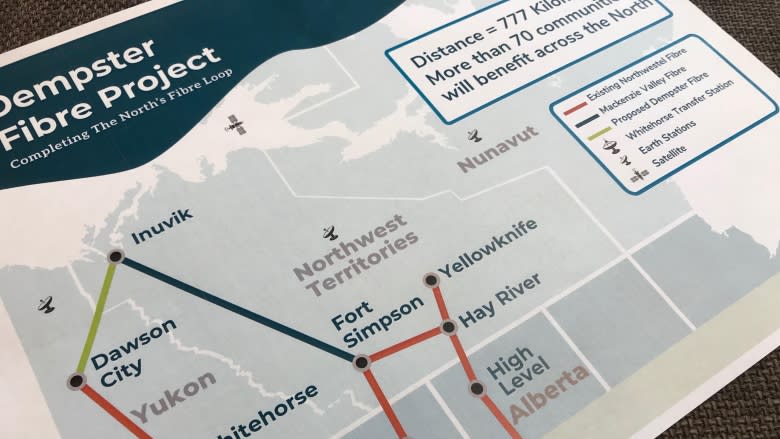Yukon government defends Dempster route for internet fibre line
A Whitehorse based information technology company says the Yukon government missed an opportunity to bring competition to the provision of internet services by choosing the Dempster Highway route for a new fibre optic cable.
The federal and territorial governments announced this week that the $79-million, 777-kilometre line will be built between Dawson City, Yukon, and Inuvik, N.W.T.
"A process that has been several years in the making has reached its sad conclusion," said Martin Lehner, from Tangerine Technology — a Whitehorse tech company — in a news release.
"What could have been a unique opportunity to introduce real competition into the telecommunications space has been shattered."
The statement says that competition reduces costs and creates better services.
The territorial government picked the Dempster Highway route and Northwestel as the operator, over connecting to an Alaskan main line in Skagway and potentially another operator.
The government has been under pressure to build a redundant connection to prevent occasional service interruptions that occur when the existing line is cut, as well as the potential for a much longer interruption due to a forest fire.
Northwestel footing some costs
Steve Sorochan, the director of technology and telecommunications development with the Yukon government, said the Dempster route was chosen for a number of reasons.
Sorochan said the Alaska route was cheaper to build — at a cost of $34 million versus $79 million for the Dempster route — but Northwestel is contributing $15 million to the construction cost of the Dempster route.
That reduces Yukon's contribution to only $5 million, with the federal government contributing $59 million. Whereas Yukon would have had to contribute $21 million for the Alaska route.
Perhaps more significant is the future operating costs.
Northwestel is taking on the estimated $60 million cost over 20 years of operating the Dempster line.
Sorochan said the government did not receive similar long-term guarantees from any of the other seven companies that made proposals for both routes, leaving open the potential that Yukon taxpayers would be paying subsidies to keep the fibre line open.
Protecting the line
The government will own the Dempster line, but Northwestel will have sole access to the line for the 20 years of its agreement with the Yukon government, and can sell broadband wholesale on it.
Sorochan said there was no point insisting the company pay a fee for that access, in addition to the operating costs and its contribution to the construction cost.
"Really, whether it's Northwestel, or another party, the Yukon government, we really don't see a significant revenue potential from the line. It really is about reliability, that's the utility of the line," he said.
Northwestel's president Curtis Shaw remarked on that at a news conference in Whitehorse on Wednesday, citing the benefits for more than 70 communities across the North.
"There's been many late nights of dealing with fibre cuts, and operational headaches of trying to repair things quickly for the innovation age," said Shaw.
"It's going to protect these communities from the impacts that forest fires have, floods have, backhoes have in construction."
Whitehorse is Northwestel's satellite hub.
The company says that means people in 25 communities in Nunavut, four in the Northwest Territories, one each in Yukon and northern B.C., lose internet service whenever the fibre line was cut between Whitehorse and Fort Nelson, B.C.
Sorochan says after the line is built and begins operating in 2021, the risk of an interruption from a cut line will be eliminated.
He said there have been four cuts in the past five years.



